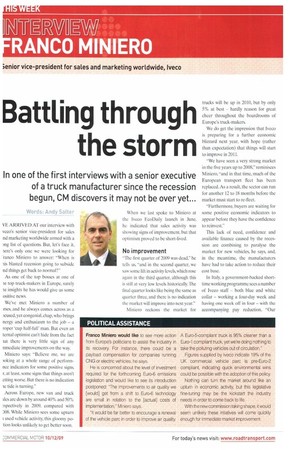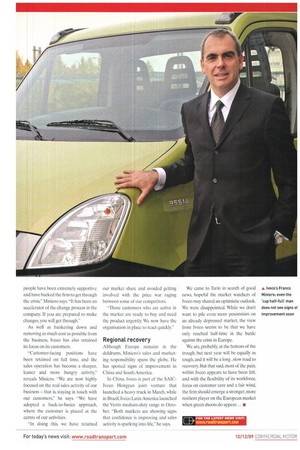Battling through the storm
Page 20

Page 21

If you've noticed an error in this article please click here to report it so we can fix it.
In one of the first interviews with a senior executive of a truck manufacturer since the recession begun, CM discovers it may not be over yet...
Words: Andy Satter
VE ARRIVED AT our interview with veco's senior vice-president for sales nd marketing worldwide armed with a )ng list of questions. But, let's face it, iere's only one we were looking for 'ranco Miniero to answer: -When is us blasted recession going to subside nd things get back to normal?"
As one of the top bosses at one of le top truck-makers in Europe, surely le insights he has would give us some ositive news.
We've met Miniero a number of mes, and he always comes across as a 3cused, yet congenial, chap, who brings nergy and enthusiasm to the job a roper 'cup half-full' man. But even an ternal optimist can't hide from the fact lit there is very little sign of any nmediate improvements on the way. Miniero says: "Believe me, we are )oking at a whole range of performnee indicators for some positive signs, r, at least, some signs that things aren't ruing worse. Hut there is no indication le tide is turning."
Across Europe, new van and truck des are down by around 40% and 50% spectively in 2009, compared with )08. While Miniero sees some upturn i used vehicle activity, this gloomy potion looks unlikely to get better soon. When we last spoke to Miniero at the Iveco EcoDaily launch in June, he indicated that sales activity was showing signs of improvement, but that optimism proved to be short-lived.
No improvement
"The first quarter of 2009 was dead," he tells us, "and in the second quarter, we saw some lift in activity levels, which rose again in the third quarter, although this is still at very low levels historically. The final quarter looks like being the same as quarter three, and there is no indication the market will improve into next year."
Miniero reckons the market for trucks will he up in 2010, but by only 5% at best hardly reason for great cheer throughout the boardrooms of Europe's truck-makers.
We do get the impression that Iveco is preparing for a further economic blizzard next year, with hope (rather than expectation) that things will start to improve in 2011.
-We have seen a very strong market in the five years up to 2008," reminisces Miniero, "and in that time, much of the European transport fleet has been replaced. As a result, the sector can run for another 12 to 18 months before the market must start to re-fleet.
"Furthermore, buyers are waiting for some positive economic indicators to appear before they have the confidence to reinvest."
This lack of need, confidence and available finance caused by the recession are combining to paralyse the market for new vehicles, he says, and, in the meantime, the manufacturers have had to take action to reduce their cost base.
In Italy, a government-backed shorttime working programme sees a number of Iveco staff both blue and white collar working a four-day week and having one week off in four with the accompanying pay reduction. "Our people have been extremely supportive and have backed the firm to get through the crisis," Miniero says. "It has been an accelerator of the change process in the company. If you are prepared to make changes, you will get through."
As well as hunkering down and removing as much cost as possible from the business, Iveco has also retained its focus on its customers.
"Customer-facing positions have been retained on full time, and the sales operation has become a sharper, leaner and more hungry activity," reveals Miniero. "We are now highly focused on the real sales activity of our business — that is, staying in touch with our customers," he says. "We have adopted a back-to-basics approach, where the customer is placed at the centre of our activities.
"In doing this, we have retained our market share and avoided getting involved with the price war raging between some of our competitors.
"Those customers who are active in the market are ready to buy and need the product urgently,. We now have the organisation in place to react quickly."
Regional recovery
Although Europe remains in the doldrums. Miniero's sales and marketing responsibility spans the globe. He has spotted signs of improvement in China and South America.
In China, Iveco is part of the SAICIveco Hongyan joint venture that launched a heavy truck in March, while in Brazil, Iveco Latin America launched the Vertis medium-duty range in October. "Both markets are showing signs that confidence is improving and sales activity is sparking into life," he says. We came to Turin in search of good news. hopeful the market watchers of Iveco may shared an optimistic outlook. We were disappointed. While we don't want to pile even more pessimisim on an already depressed market, the view from lveco seems to be that we have only reached half-time in the battle against the crisis in Europe.
We are, probably, at the bottom of the trough, but next year will be equally as tough, and it will be a long , slow road to recovery. But that said, most of the pain, within Iveco appears to have been felt, and with the flexibility of its workforce, focus on customer care and a fair wind, the firm should emerge a stronger, more resilient player on the European market when green shoots do appear... •








































































































































